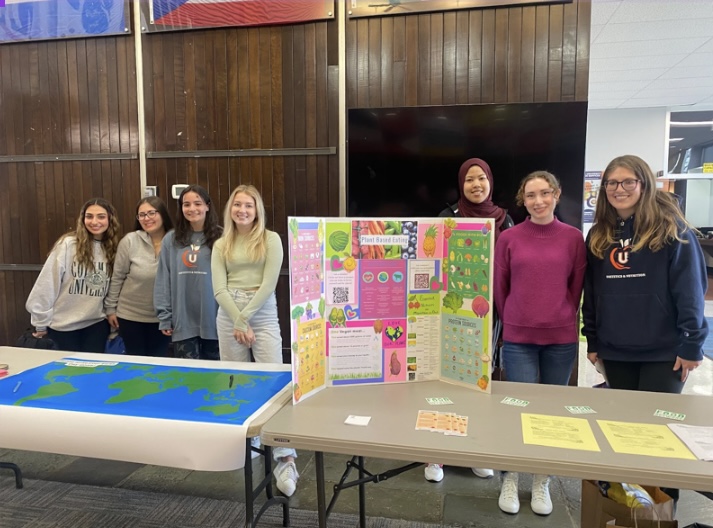Global Nutrition students show importance of food sustainability and its effects on wildlife protection
Students at the Earth Day Presentation from Terri Provost’s Global Nutrition class at Utica University.
April 27, 2023
Biology professor Terri Provost and students from her Global Nutrition class hosted an Earth Day event on April 18 that raised awareness of the effect that food sustainability has on the environment.
A large concern right now is the extinction of the white rhino since only two females are remaining, mainly due to habitat loss from agriculture.
The northern white rhino is a relatively nonaggressive species, and they live in herds. This unique species can weigh over 1,000 pounds, being the second-largest land mammal. The last sighting of a wild northern white rhino was in 2006. With only two females left in this world, reproducing is not possible.
“The land that white rhinos used was affected by agriculture which decreased the size of their habitat,” Provost said.
Not only does agriculture cause habitat loss, but it increases methane production and decreases the amount of carbon dioxide absorbed into the ground, which can lead to climate change.
Global Nutrition students provided a recent study that shows that one-horned rhinos are susceptible to climate change due to the increase of flooding.
“We are raising awareness of the fact that white rhinos are extinct in the wild,” said Kaelyn McMullan, a junior who is in the Global Nutrition class. “Educating others on this issue can help the preservation of other rhino species as well as biodiversity.”
The advocacy for food sustainably promotes the protection of the Earth, which allows for people and species to flourish. Small steps that can be taken to contribute to food sustainability were presented at the event and include practicing a plant-based diet and reducing food waste.
“Our main goal is to educate students on the importance of sustainability and food waste,” said senior Aleeyehyah Adnan, another student from the class. “We are providing students with ways to be more sustainable in everyday life that can create a positive impact on our environment.”
Utica University’s on-campus food pantry, the Tangerine Grove, is a service that aids in food sustainability. The mission of this food pantry is to alleviate hunger in Utica. Through food donations, the program reduces hunger and food waste. The impact this program makes contributes to the larger cause of protecting the environment.
“The first step towards this cause is to know where your food comes from and to have a good relationship with food,” Provost said.
For more information on rhino conservation visit Save the Rhino International | Rhino Conservation Charity.




































































































































